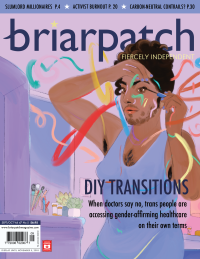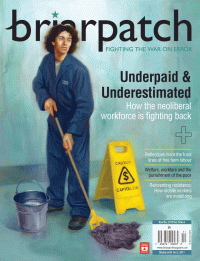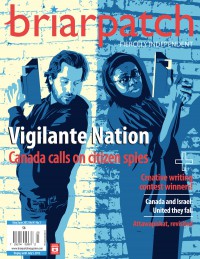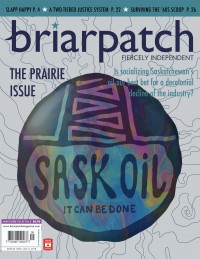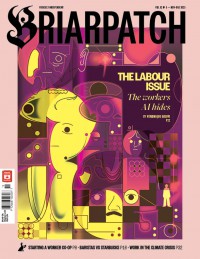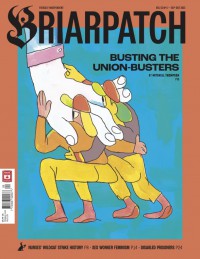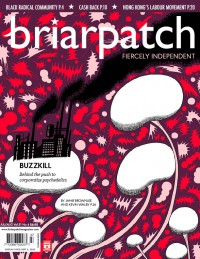
Education for a change
The education system represents both our best hope of emancipatory change and the primary mechanism for replicating the status quo. In this issue, Briarpatch surveys this contested space, exploring the challenges and opportunities the current moment presents to allow us to rethink the ways we share knowledge (and consequently power) with one another, with our children, and with the children of others.
-
 Magazine
MagazineLetter from the editor
For two summers several years ago I worked as a literacy tutor for migrant workers in southern Ontario. I had read Paolo Freire’s Pedagogy of the Oppressed and brought with me all kinds of ideas about popular education, but it was all just theory for me at that point. Those two summers taught me more about power, privilege, dignity and the emancipatory potential of education than anything I have done before or since.
-
 Magazine
MagazineThe myth of the multicultural patchwork
Multiculturalism – the idea that the existence of multiple cultures within Canada should be accepted and encouraged – has been official state policy since 1971. Celebration of the diversity of our northern cultural kaleidoscope has become a mark of national pride. But while the myth of multiculturalism encourages us to imagine Canada as an anti-racist state, it has done little to actually end the racial inequities that permeate Canadian learning. Why?
-
 Magazine
MagazineThe road to Flobbertown
Remember Grade 3, when school was all about storybooks and gym class and crafts? We had to learn our multiplication tables and cursive writing, too, but these are not the memories we tend to hang on to.
-
 Magazine
MagazineGeneration debt
Education is increasingly thought to be for the good of the individual rather than for the greater good of society – a belief that has made it politically acceptable to place the bulk of education costs squarely on the shoulders of the students seeking that education.
-
 Magazine
MagazineB.A., M.A., McJob
Imagine opening your morning paper to read the following: “The Minister of Human Resources announced today that she will be working with the provinces to lower university and college enrolments across the country. ‘We don’t think young Canadians should be wasting their time with post-secondary education,’ the Minister said. ‘It’s not good for them and it’s not good for the Canadian economy.’”
-
 Magazine
MagazineFreedom & absurdity
The Sunday blues are back, familiar and unwelcome like symptoms of an old illness.
-
 Magazine
MagazineCorporate crisis, community opportunity
After World War II, muckraking journalist Edward R. Murrow asked Dave Schoenbrun, a bright young interpreter at Allied Force Headquarters, what his post-war plans were. Schoenbrun expressed his desire to return to teaching high school French, to which Murrow responded: “Kid, how would you like the biggest classroom in the world?” To Murrow, the most renowned figure in U.S. broadcast journalism, education was the primary purpose of news reporting.
-
 Magazine
MagazineRetooling schooling
Quest for Community, a new program of the public school system in the West Kootenay region of British Columbia’s Southern Interior, aims to sow the seeds of community in the most fertile soil there is – the minds of youth.
-
 Magazine
MagazineNorman Bethune
Was Dr. Norman Bethune truly an extraordinary Canadian? In a new biography of the medical pioneer who died in China in 1939 while serving Mao’s forces, Adrienne Clarkson takes the view that Bethune was profoundly Canadian in his world view, and that his work indeed had an extraordinary impact on the world.
-
 Magazine
MagazineWho taught you to teach, professor?
University professors are a curious bunch. Many are gifted and dedicated post-secondary teachers, working hard to educate and inspire their students, while others, despite having succeeded only at school work, exude arrogance and an exaggerated sense of themselves.

